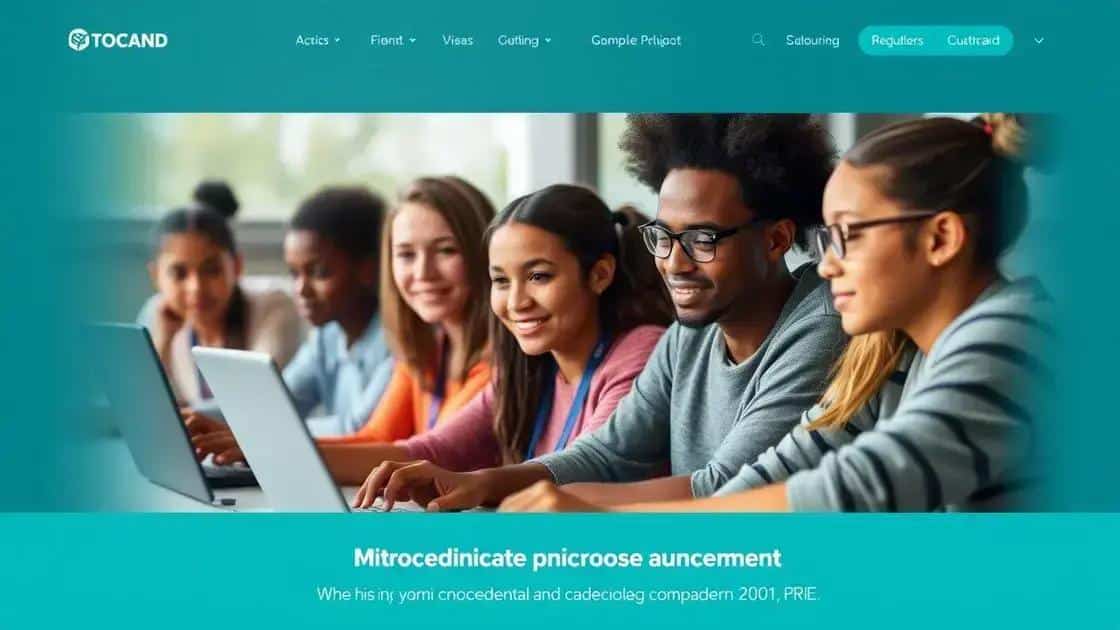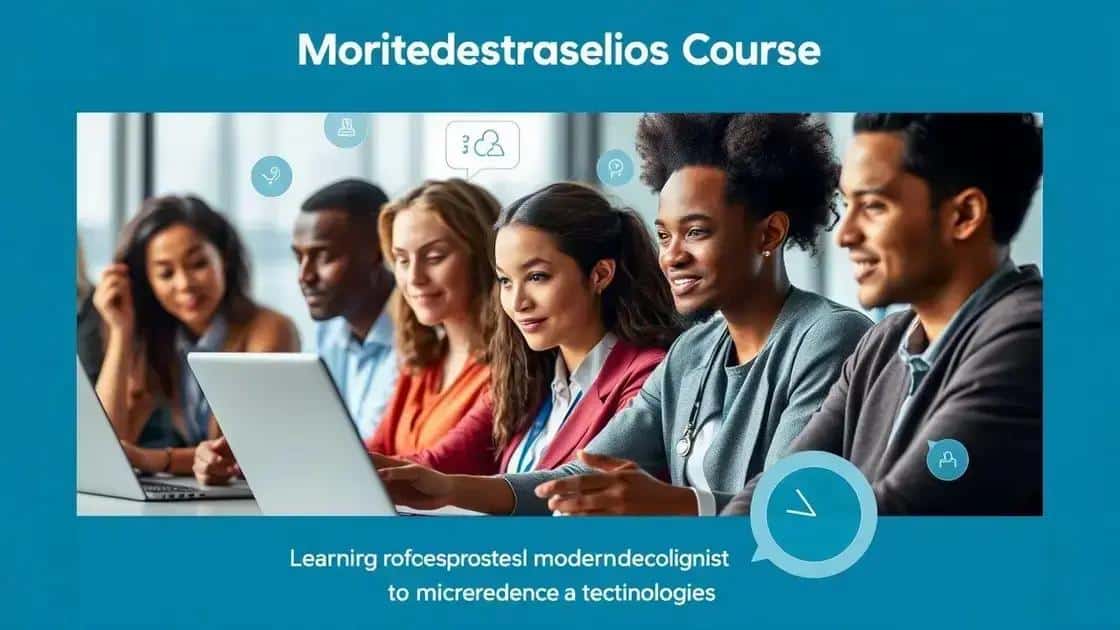Microcredential education paths trends: what to expect

Microcredential education paths trends focus on short, skill-specific programs that enhance job readiness, offering personalized and flexible learning options in response to the evolving job market.
Microcredential education paths trends are gaining momentum in today’s fast-paced job market. Have you noticed how many professionals are turning to short, focused courses? Let’s dive into what these trends mean for your educational journey.
Understanding microcredential education
Understanding microcredential education is crucial in today’s fast-evolving job market. As traditional degrees take longer to complete, more professionals are seeking shorter, more focused learning paths. Microcredentials provide a solution, allowing individuals to gain specific skills efficiently.
What are Microcredentials?
Microcredentials are short, targeted educational programs that focus on specific skills or competencies. These courses typically take less time to complete than traditional degrees and often come with a certification upon completion. This flexibility makes them appealing to both learners and employers.
Benefits of Microcredential Education
There are several key benefits to pursuing microcredentials:
- Flexibility: Many microcredential programs are available online, allowing you to learn at your own pace.
- Cost-Effectiveness: Compared to traditional education, microcredentials are often more affordable.
- Career Advancement: Completing a microcredential can help you gain skills that are directly applicable to your job, improving your career prospects.
As companies continue to evolve, they often seek candidates who have the specific skills that microcredentials provide. This trend means that those with relevant microcredentials have a distinct advantage in the job market.
The value of microcredential education is further highlighted by industry partnerships with universities and organizations, which ensure that programs stay current with job market demands. By focusing on practical skills, these programs improve employability while reducing the time spent in formal education.
Current trends in microcredentialing

Current trends in microcredentialing are reshaping how education connects with employment. As industries evolve, the need for specific skills continues to grow, making microcredentials an essential part of professional development.
Rise of Online Learning Platforms
One major trend in microcredentialing is the rise of online learning platforms. These platforms offer flexibility, allowing learners to study at their own pace. As a result, more people are pursuing microcredential courses to enhance their skills.
Industry Collaboration
Another significant trend is the collaboration between education providers and industries. Companies are partnering with universities and training organizations to develop programs that meet specific job market needs. This ensures that learners acquire relevant skills that employers are actively seeking.
- Customized Learning Paths: Many programs are now tailored to fit the unique requirements of specific industries.
- Stackable Credentials: Learners can combine microcredentials to build a more comprehensive qualification portfolio.
- Focus on Lifelong Learning: There is a growing emphasis on continuous education and skill enhancement throughout one’s career.
As organizations seek employees who can adapt quickly, they value microcredentialing as a way for candidates to prove their competencies. The demand for microcredential programs is fueled by the fast-paced changes in technology and job functions.
Employers increasingly recognize microcredentials as proof of a candidate’s dedication to professional growth. This recognition opens up more opportunities for individuals with these qualifications, enhancing their career trajectories.
Benefits of pursuing microcredentials
There are numerous benefits to pursuing microcredentials in today’s educational landscape. As job markets evolve, both individuals and employers recognize the value of these compact courses.
Enhancing Career Opportunities
One of the most significant advantages of microcredentials is the potential for enhanced career opportunities. By acquiring targeted skills, learners can differentiate themselves in a competitive job market. Employers often prefer candidates with specific proficiencies that microcredentials provide.
Flexibility and Accessibility
Microcredentials also offer flexibility and accessibility. Many courses are available online, allowing learners to study from anywhere at their convenience. This flexibility supports busy professionals who need to balance work and education.
- Cost-Effectiveness: Microcredentials typically cost less than full degrees, making them more accessible financially.
- Time Efficiency: Most programs require less time to complete, allowing learners to gain skills quickly.
- Specialization: Microcredentials allow for specialization in niche areas, which can lead to higher demand in the job market.
The structured approach of microcredential education helps learners focus on what they need to advance their careers. With defined goals and outcomes, participants can track their progress and stay motivated throughout the process.
Employers increasingly recognize these credentials as proof of a candidate’s commitment to professional growth. As a result, having microcredentials can positively impact one’s career trajectory, opening doors that may have previously been closed.
Future predictions in education pathways

Future predictions in education pathways highlight significant shifts we can expect in learning and skill development. As technology advances, the landscape of education is rapidly changing to meet the needs of modern learners.
Increased Personalization
One prediction is that education will become more personalized. Using data and analytics, learning experiences can be tailored to individual needs. This means that each learner can progress at their own speed, focusing on areas that require more attention.
Growth of Hybrid Learning Models
Hybrid learning models combining online and in-person education are also gaining prominence. This approach provides flexibility while maintaining the advantages of face-to-face interactions. Students will have the option to choose the format that best suits their learning style.
- Integration of AI: Artificial intelligence will play a larger role in creating adaptive learning environments.
- Focus on Soft Skills: Employers increasingly seek soft skills, so education will emphasize these critical abilities alongside technical knowledge.
- Competency-Based Learning: Learning will shift to a competency-based model where students advance by demonstrating mastery of skills.
As we look to the future, the role of microcredentials is likely to expand. They will serve as a bridge between traditional education and the skills needed for specific careers. This evolution means that a degree alone may not be enough; learners will need to supplement their education with targeted credentials.
The landscape of education pathways in the future will reflect a deep commitment to lifelong learning. As industries evolve, so too will the skills required, making it essential for individuals to engage in continuous education.
FAQ – Frequently Asked Questions about Microcredential Education
What are microcredentials?
Microcredentials are short, focused educational programs that validate specific skills or competencies, making them attractive to both learners and employers.
How can microcredentials help my career?
Microcredentials can enhance your job prospects by allowing you to gain targeted skills quickly and demonstrate your commitment to professional development.
Are microcredential programs flexible?
Yes, many microcredential programs are offered online, providing flexibility to study at your own pace and on your own schedule.
What is the future of education pathways with microcredentials?
The future will likely see more personalized learning experiences and a stronger emphasis on microcredentials to meet specific job market needs.





